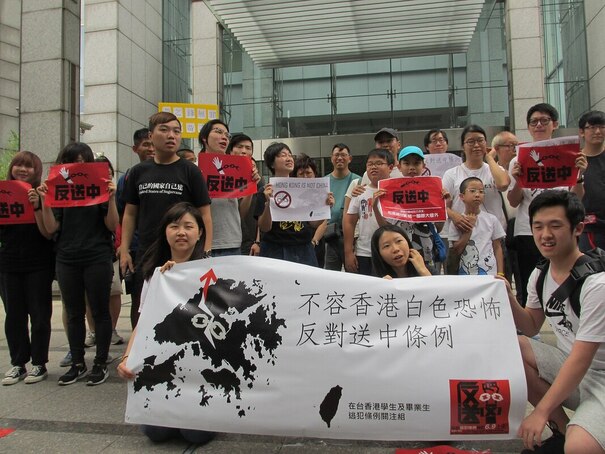|
By: Olivia Novosel Resurgence of Protesters Amid the COVID-19 Pandemic Since the protests began in June 2019, Hong Kong has developed into a state of political unrest and uncertainty, with no sign of resolution. What started as a protest against the controversial Fugitive Offenders extradition bill has evolved into something more. This has instigated many Hong Kongers to call for greater democratic reform and accountability for police brutality. Although subdued by the outbreak of COVID-19 in December of 2019, the anger of the city and its people have not gone dormant. Tensions rise once again, as recent mass arrests of pro-democracy activists have reinvigorated opposition in Hong Kong.
“One country, two systems” - a constitutional principle adopted by the People’s Republic of China in 1997 that would describe the governance of Hong Kong. Essentially, Hong Kong would be able to maintain an independent economic and administrative system; retaining its own government while avoiding Chinese socialism. This principle proved effective until the summer of 2019 when The People’s Republic of China (PRC) proposed amendments that would allow for the extradition of suspects into China for trial. This exploitive proposition undermines the constitutional principle, subjecting the citizens of Hong Kong to a legal system within Chinese jurisdiction. This triggered an uproar amongst the population of Hong Kong, prompting the city to act. Within a few days, hundreds of thousands of protestors gathered around the city’s legislative building, blocking lawmakers from entering to debate the new amendments. Eventually, the PRC would implement military intervention attempting to control the situation. Five demands were listed by the protesters; a withdrawal of the extradition bill, release and exoneration of arrested protesters, classification of the demonstrations as protests and not “riots”, establishment of an independent commission of inquiry into police behaviour and the resignation of Carrie Lam, Hong Kong’s Chief Executive. Although the bill was officially aborted in October 2019, the movement had already shone light on other political injustices and police misconduct, leaving the other 4 demands unmet. The protests spanned for months, but eventually decreased in size and intensity due to COVID-19 restrictions. However, the movement had not been silenced, as Hong Kong once more unites against newly developed national security laws which seeks to reduce the city’s autonomy. The protests as well raise concerns over public health and safety. As during the initial protests in 2019, the Hong Kong Police failed to abide by international humanitarian laws. Leading to global condemnation for their use of excessive force, tear gas, rubber bullets and real ammunition. There have been 2 deaths confirmed and over 2,500 injuries reported since June 2019. Healthcare workers in Hong Kong have as well volunteered among the protesters to treat injuries and provide off-site medical care to those who feared arrest if admitted to hospitals. Currently, in the wake of COVID-19, the Hong Kong government has decided to postpone elections for one year, citing risk to public health. This decision came as a hit against the pro-democratic supporters who hoped to attain a majority win in the Legislative Council. Anti-government sentiment has led many protesters to speculate that the circumstances of the pandemic are being used to achieve the government’s own political agenda rather than ensure the safety of citizens. Inevitably, this has only escalated the distrust that the people of Hong Kong feel against their government, as it is fueling the next wave of predicted protests. Although the Hong Kong Protests have been overshadowed by the COVID-19 pandemic, it does not indicate that they have ended. Looking back on over a year of turmoil and protest, Hong Kong continues to stand against anti-democratic rhetoric and fight for the rights of its people, even at the cost of their health and safety. References British Broadcasting Corporation. (2019, December 13). Hong Kong-China extradition plans explained. BBC News. https://www.bbc.com/news/world-asia-china-47810723. British Broadcasting Corporation. (2020, June 30). Hong Kong security law: What is it and is it worrying? BBC News. https://www.bbc.com/news/world-asia-china-52765838. Davidson, H. (2020, September 6). Almost 300 arrests as Hong Kong protesters oppose election delay. The Guardian. https://www.theguardian.com/world/2020/sep/06/hong-kong-protesters-oppose-election-delay-arrests. Guardian News and Media. (2019, November 14). Second death in week as Xi Jinping demands end to Hong Kong violence. The Guardian. https://www.theguardian.com/world/2019/nov/14/second-death-in-hong-kong-protests-as-xi-demands-end-to-violence. John, T. (2019, August 30). Why Hong Kong is protesting: Their five demands listed. CNN. https://www.cnn.com/2019/08/13/asia/hong-kong-airport-protest-explained-hnk-intl/index.html. Mann, D. (2019, November 21). International humanitarian norms are violated in Hong Kong. The Lancet. https://www.thelancet.com/journals/lancet/article/PIIS0140-6736(19)32909-5/fulltext. Parry, J. (2019, August 5). Hong Kong healthcare workers join protests. The BMJ. https://www.bmj.com/content/366/bmj.l5027. Weizent. (2019, August 29). China sends fresh troops into Hong Kong as military pledges to protect 'national sovereignty'. CNBC. https://www.cnbc.com/2019/08/29/hong-kong-protests-chinese-pla-sends-new-military-troops-into-sar.html. Wikimedia Foundation. (2020, December 1). Legislative Council of Hong Kong. Wikipedia. https://en.wikipedia.org/wiki/Legislative_Council_of_Hong_Kong. Wikimedia Foundation. (2020, November 30). One country, two systems. Wikipedia. https://en.m.wikipedia.org/wiki/One_country,_two_systems. Yu, E. (2020, March 10). China's puppet in Hong Kong. Vox. https://www.vox.com/world/2020/3/10/21163170/hong-kong-coronavirus-protests-carrie-lam-china-democracy. Yu, E., & Ramzy, A. (2020, April 18). Amid Pandemic, Hong Kong Arrests Major Pro-Democracy Figures. The New York Times. https://www.nytimes.com/2020/04/18/world/asia/hong-kong-arrests.html.
0 Comments
Your comment will be posted after it is approved.
Leave a Reply. |
Categories |


 RSS Feed
RSS Feed